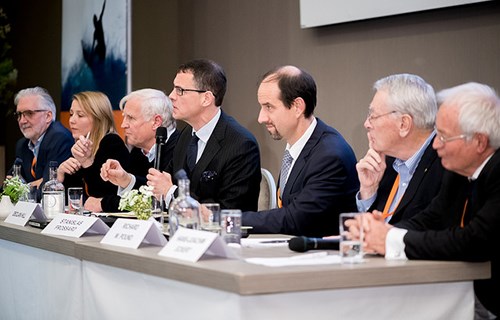Sports reform – a need for outside intervention?

Panel on sports governance reforms during Play the Game 2017. Photo: Thomas Søndergaard/Play the Game
28.11.2017
By Marcus HoyCanadian author and journalist Declan Hill was in no doubt that the governing bodies are not up to the task.
“Sport is far too important to be left to sports officials,” he told Play the Game 2017. “Imagine a meat packing plant that chooses to self-regulate instead of being subject to inspections. Would you eat their sausages?”
However, Danish National Olympic Committee (NOC) President Niels Nygaard disagreed. “Sport needs to keep its autonomy because 98 percent of it is fantastic,” he said. “At least with the European model, it is based on volunteers, inclusion and sport for all.”
Nygaard and Hill were members of a diverse panel at Play the Game 2017 that also included IOC member and former WADA president Richard W. Pound, Stanislav Frossard, executive secretary of the Council of Europe’s Sports Division (EPAS) and Hans-Joachim Eckert, a lawyer at the Zurich-based Sports Governance Unit and former head of the adjudicatory arm of the FIFA Ethics Committee.
Hill, who is an outspoken critic of many of sport’s governing bodies, urged reform-minded attendees to “raise their game” in the light of revelations at the ongoing FIFA bribery and corruption trial in New York.
“Not a single person is arguing in that court that FIFA, CONCAEF etc. should not be deemed criminal organisations,” Hill pointed out. “Individual actions are being defended, but the organisations are not. The world is changing in that Brooklyn courtroom. We are dealing with criminal institutions, mafia. Not everyone, not all sports organisations, but a significant number.”
Not enough to talk about ethics
Like some private sector companies, he said, many sports institutions hire “third party” consultants and experts to “shape and fabricate the debate”. The November 19 murder of Adolfo Lagos, the vice president of the Mexican broadcaster Grupo Televisa, was likely linked to the criminal investigation into FIFA, he implied.
“This must have made things very convenient for the Mexican media and establishment,” Hill said. “It is not enough to talk about ethics and codes of conduct. These are now being recognised as criminal organisations.”
While recognising that reform is needed, Nygaard said intervention from outside could be counterproductive as it would imply the end of sport’s autonomy. The NOC of Denmark, he pointed out, had succeeded in placing a number of reform-minded people onto the boards of international sports federations by using the existing structures.
“We have a situation where many countries work within their own culture, and old boys’ networks make it difficult to make changes,” Nygaard said. However, he added that in many organisations the culture of officialdom is improving. Pressure for reform should be applied both internally and externally, Nygaard stressed.
“Of course, when criminality occurs, sport officials should be treated in the same way as other criminals,” he said.
Resistance to change
Hans-Joachim Eckert spoke of the reforms to FIFA that were implemented after the 2010 votes for the 2018 and 2022 World Cups, and subsequent bribery allegations. These reforms, he said, included the formation of an independent Ethics Committee and the adoption of a code of ethics.
“It is important that nominations for the Ethics Committee come from outside,” he said. “Persons bound by the ethics code are required to co-operate with investigations, including handing over emails and bank records. Independence is necessary as there should be no pressure from the top. You need independent people.”
Large sports organisations such as FIFA, Eckert said, are bound to be resistant to change, and thus political control is needed, as well as external control over the flow of money.
“It’s always the same,” he said. “People are greedy and people want power. Those at the top of the sports organisations have a lot of power and a lot of money, and they do not want to give it up.”
“For me there is no difference between the managers of the big companies worldwide and the big officials of FIFA, for example,” Eckert said. “One difference could be that there are no shareholders in FIFA. You look where these big organisations are based, in Switzerland, it’s is not for the mountains or the snow.”
Individual invites
Former World Anti-Doping Agency President Richard W. Pound asked whether the IOC could have responded differently to the Russian doping scandal ahead of the 2016 Rio Olympic Games. A blanket ban on Russian athletes, he said, could have been supplemented by individual invites to those who were able to demonstrate that they were not part of the system. However, he added that he did not think such invited athletes should have been permitted to compete under the Russian flag.
The IOC’s Ethics Committee, Pound said, could also have been a lot more rigorous in its investigations. On numerous occasions, he pointed out, the IOC has taken no action until athletes or officials are subject to an external criminal investigation or prosecution.
Back in 1999, Pound said, ten members of the IOC were expelled without criminal charges being brought, but similar action has been rare in recent years. Sport’s autonomy, Pound concluded, “cannot be just asserted, it must be earned.”
EPAS executive secretary Stanislas Frossard described the aims of a new initiative, the International Partnership Against Corruption in Sport (IPACS), which aims to bring together international sports organisations, governments and other relevant stakeholders to eliminate corruption and promote a culture of good governance. This platform, he said, could be a method of achieving reform with the participation of both the sports organisations themselves and external parties.

Read more about Play the Game 2017





